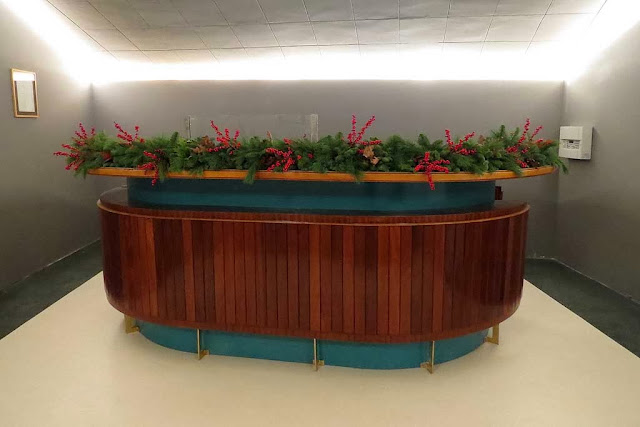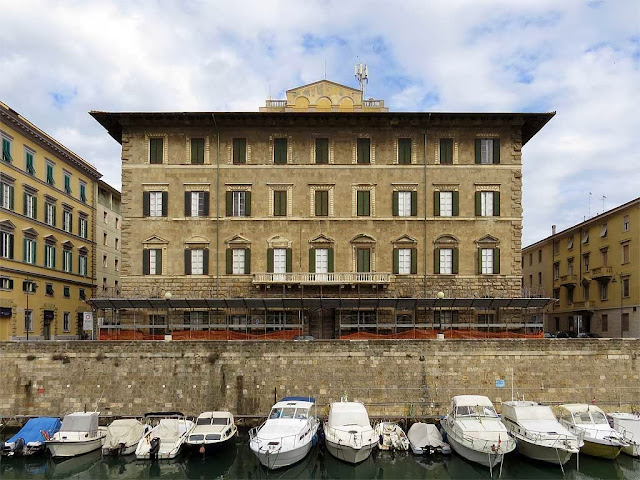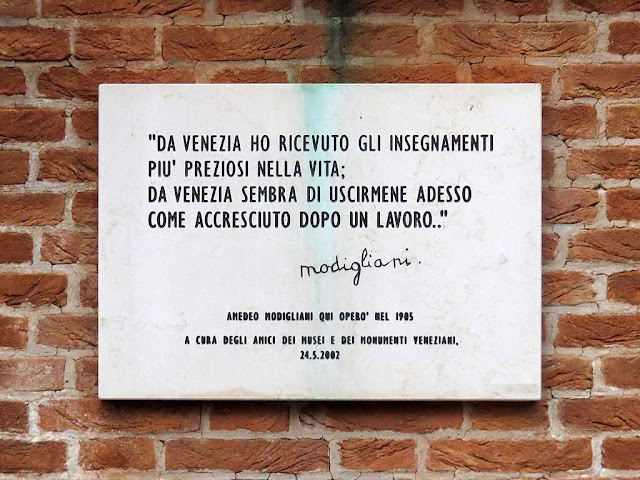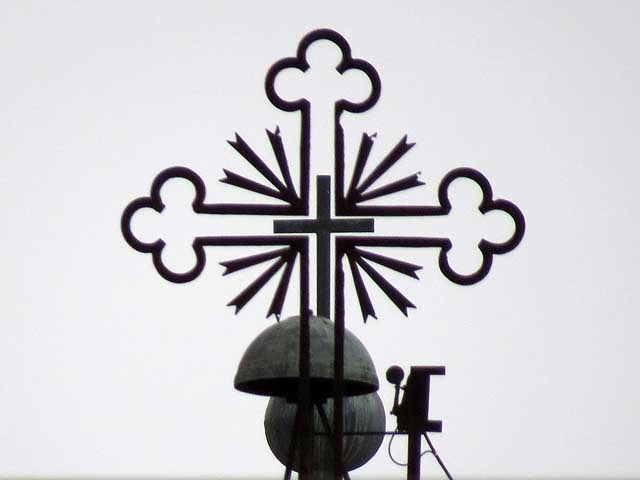Almost everyone in Livorno has queued at the ticket counter of the La Gran Guardia theater: for a show or a movie, sometimes for a concert or even an opera. (Picture taken in April 2011)
The same counter, refurbished and respectfully modernized, now sits at the entrance of the new cinema.
See also: La Gran Guardia - The New Gran Guardia
Saturday, November 30, 2013
Friday, November 29, 2013
The New Gran Guardia
Our Odeon and Moderno cinemas are now parking silos, but part of the La Gran Guardia movie theater is reborn today.
The new cinema has two 150-seat theaters equipped with state-of-the-art 4K digital projectors.
A small space decorated with old posters and with two of the original seats of the old cinema.
See also: Cinema Odeon - La Gran Guardia - Cinema Moderno - Odeon Parking - Odeon Parking, Sardi Street - Red and Gold
External links: 4K resolution (Wikipedia)
The new cinema has two 150-seat theaters equipped with state-of-the-art 4K digital projectors.
A small space decorated with old posters and with two of the original seats of the old cinema.
See also: Cinema Odeon - La Gran Guardia - Cinema Moderno - Odeon Parking - Odeon Parking, Sardi Street - Red and Gold
External links: 4K resolution (Wikipedia)
Thursday, November 28, 2013
Palazzo Maurogordato
Giorgio (Zorzis) Maurogordato was a rich merchant of Greek origin living in Livorno. The Maurogordato (Greek: Μαυροκορδάτος) were a family of Phanariot Greeks that distinguished itself in the history of the Ottoman Empire, Wallachia, Moldavia, and modern Greece.
In the second half of the 19th century he bought one of the parcels resulting from the straightening of the Fosso Reale, a work undertaken by the architect Luigi Bettarini after the demolition of the city walls.
In 1856 he had the architect Giuseppe Cappellini design and build a Renaissance Revival palazzo for him and his family. The building was finished in 1864 and shows an extensive use of rusticated stone.
External links: Mavrocordatos family - Phanariotes (Wikipedia)
In the second half of the 19th century he bought one of the parcels resulting from the straightening of the Fosso Reale, a work undertaken by the architect Luigi Bettarini after the demolition of the city walls.
In 1856 he had the architect Giuseppe Cappellini design and build a Renaissance Revival palazzo for him and his family. The building was finished in 1864 and shows an extensive use of rusticated stone.
External links: Mavrocordatos family - Phanariotes (Wikipedia)
Wednesday, November 27, 2013
Samar
“Samar” is a 77-meter luxury motor yacht designed by Laurent Giles, with interior styling by Joe Thome. She was built by Devonport Yachts in Falmouth, England, and launched in 2006. The yacht has a range of 6.000 nautical miles and is provided with a helipad.
Search labels: yacht
Search labels: yacht
Tuesday, November 26, 2013
Bus on Fire
Last Sunday a bus took fire in Via Magenta and this is what was left of its back.
In the early afternoon the bus was still waiting for removal...
... which happened just while I was passing by.
See also: Fire - Pilotina Due - Theme Day: My Street
In the early afternoon the bus was still waiting for removal...
... which happened just while I was passing by.
See also: Fire - Pilotina Due - Theme Day: My Street
Monday, November 25, 2013
Modigliani in Venice
Plaque on the facade of a building on Fondamenta San Basegio, where Amedeo Modigliani had his studio in Venice in 1905. The quotation is from a letter to the Livornese painter and friend Oscar Ghiglia.
“Modigliani moved to Venice in the spring of 1903 and enrolled in the Scuola Libera del Nudo at the Accademia delle Belle Arti in May. All his life Modigliani made friends easily, and he was making contact with a distinguished group: Umberto Boccioni, the Futurist painter and sculptor, Fabio Mauroner, with whom he shared a studio in the San Barnaba quarter and whose interests would include sculpture, painting, the graphic arts, and art criticism; as well as artists Mario Crepet, Cesare Mainella, Guido Marussig, Ardengo Soffici, and Guido Cadorin. Such encounters with the cream of intellectual and artistic life in Venice suggest assiduous cultivation. Perhaps it was in Venice that Modigliani learned the pivotal rule for the up-and-coming young artist, the right cafés at the right moment. In Venice it was the Florian, which never closed. Meanwhile he occasionally went to life classes, relying on his eye and the lessons to be had by daily visits to the great museums, studying the Bellinis and Carpaccios with concentration.”
External links: The Misunderstood Death of Modigliani (The New York Times) - Meryle Secrest (Wikipedia)
Search labels: Modigliani
“Da Venezia ho ricevuto gli insegnamenti più preziosi della vita;
da Venezia sembra di uscirmene adesso come accresciuto dopo un lavoro..”
(From Venice I received the most valuable lessons of life,
on leaving Venice I feel like I am grown after a work..)
da Venezia sembra di uscirmene adesso come accresciuto dopo un lavoro..”
(From Venice I received the most valuable lessons of life,
on leaving Venice I feel like I am grown after a work..)
“Modigliani moved to Venice in the spring of 1903 and enrolled in the Scuola Libera del Nudo at the Accademia delle Belle Arti in May. All his life Modigliani made friends easily, and he was making contact with a distinguished group: Umberto Boccioni, the Futurist painter and sculptor, Fabio Mauroner, with whom he shared a studio in the San Barnaba quarter and whose interests would include sculpture, painting, the graphic arts, and art criticism; as well as artists Mario Crepet, Cesare Mainella, Guido Marussig, Ardengo Soffici, and Guido Cadorin. Such encounters with the cream of intellectual and artistic life in Venice suggest assiduous cultivation. Perhaps it was in Venice that Modigliani learned the pivotal rule for the up-and-coming young artist, the right cafés at the right moment. In Venice it was the Florian, which never closed. Meanwhile he occasionally went to life classes, relying on his eye and the lessons to be had by daily visits to the great museums, studying the Bellinis and Carpaccios with concentration.”
(Meryle Secrest, Modigliani: A Life, 2011)
External links: The Misunderstood Death of Modigliani (The New York Times) - Meryle Secrest (Wikipedia)
Search labels: Modigliani
Labels:
Modigliani,
plaque,
Venice
Sunday, November 24, 2013
A Cross within a Cross
The church of Santa Maria del Soccorso has two external crosses: a large and hollow one above the facade and a smaller and simpler one on the top of its dome. There is only one point in Via Magenta from where we can see the two crosses one inside the other.
If you try to check this out be careful: the exact spot lies in the middle of the roadway.
See also: Santa Maria del Soccorso - Four Noses
If you try to check this out be careful: the exact spot lies in the middle of the roadway.
See also: Santa Maria del Soccorso - Four Noses
Subscribe to:
Posts (Atom)














